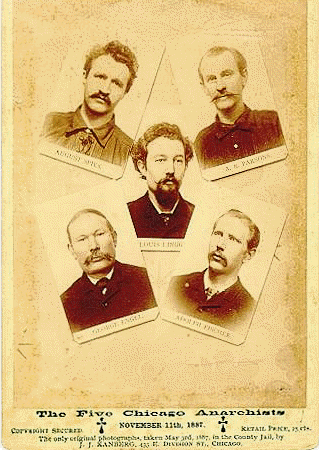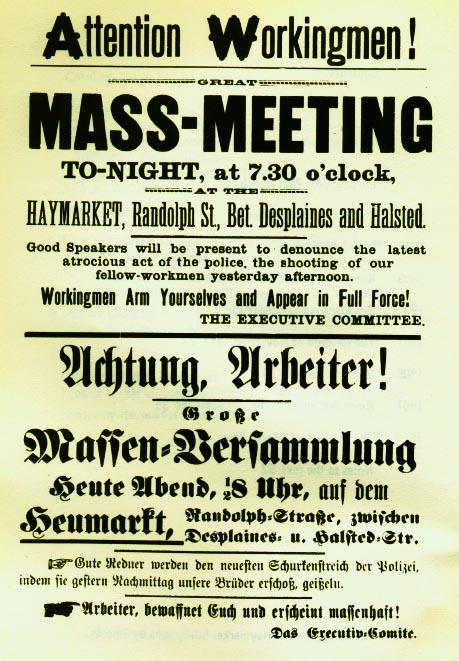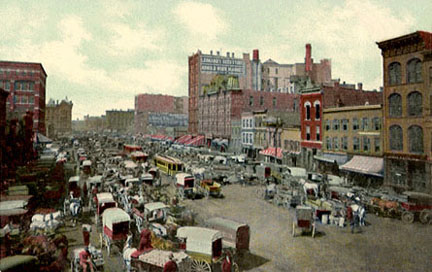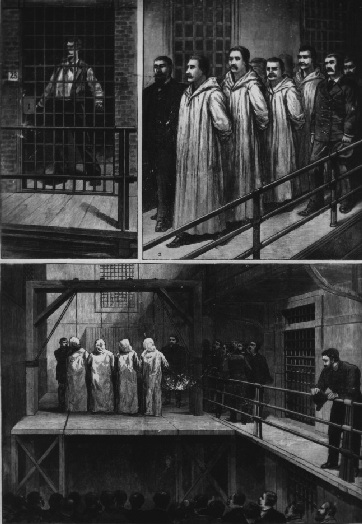Chicago Indymedia : http://chicago.indymedia.org/archive
LOCAL Review :: Labor
May Day and the Haymarket Martyrs
In memory of Albert Parsons, August Spies, George Engel, Adolph Fischer, Louis Lingg, Michael Schwab, Samuel Fielden and Oscar Neebe. Their courage and sacrifice for the emancipation of labor continues to inspire millions around the
world. We will never forget.







"The time will come when our silence will be more powerful than the voice you are throttling today."
- August Spies from the gallows.
May Day - The Real Labor Day
May 1st, International Workers' Day, commemorates the historic struggle of working people throughout the world, and is recognized in every country except the United States and Canada. This despite the fact that the holiday began in the 1880s in the United States, with the fight for an eight-hour work day.
In 1884, the Federation of Organized Trades and Labor Unions passed a resolution stating that eight hours would constitute a legal day's work from and after May 1, 1886. The resolution called for a general strike to achieve the goal, since legislative methods had already failed. With workers being forced to work ten, twelve, and fourteen hours a day, rank-and-file support for the eight-hour movement grew rapidly, despite the indifference and hostility of many union leaders. By April 1886, 250,000 workers were involved in the May Day movement.
The heart of the movement was in Chicago, organized primarily by the anarchist International Working People's Association. Businesses and the state were terrified by the increasingly revolutionary character of the movement and prepared accordingly. The police and militia were increased in size and received new and powerful weapons financed by local business leaders. Chicago's Commercial Club purchased a $2000 machine gun for the Illinois National Guard to be used against strikers. Nevertheless, by May 1st, the movement had already won gains for many Chicago clothing cutters, shoemakers, and packing-house workers. But on May 3, 1886, police fired into a crowd of strikers at the McCormick Reaper Works Factory, killing four and wounding many. Anarchists called for a mass meeting the next day in Haymarket Square to protest the brutality.
The meeting proceeded without incident, and by the time the last speaker was on the platform, the rainy gathering was already breaking up, with only a few hundred people remaining. It was then that 180 cops marched into the square and ordered the meeting to disperse. As the speakers climbed down from the platform, a bomb was thrown at the police, killing one and injuring seventy. Police responded by firing into the crowd, killing one worker and injuring many others.
Although it was never determined who threw the bomb, the incident was used as an excuse to attack the entire Left and labor movement. Police ransacked the homes and offices of suspected anarchists and socialists, and hundreds were arrested without charge. Anarchists in particular were harassed, and eight of Chicago's most active - Albert Parsons, August Spies, George Engel, Adolph Fischer, Louis Lingg, Michael Schwab, Samuel Fielden and Oscar Neebe - were charged with conspiracy to murder in connection with the Haymarket bombing. A kangaroo court found all eight guilty, despite a lack of evidence connecting any of them to the bomb-thrower (only one was even present at the meeting, and he was on the speakers' platform), On August 19th seven of the defendants were sentenced to death, and Neebe to 15 years in prison. After a massive international campaign for their release, the state 'compromised' and commuted the sentences of Schwab and Fielden to life imprisonment. Lingg cheated the hangman by committing suicide in his cell the day before the executions. On November 11th 1887 Albert Parsons, George Engel, August Spies and Adolf Fischer were hanged.
Pardoned
600,000 working people turned out for their funeral. The campaign to free Neebe, Schwab and Fielden continued.
On June 26th 1893 Governor Altgeld set them free. He made it clear he was not granting the pardon because he thought the men had suffered enough, but because they were innocent of the crime for which they had been tried. They and the hanged men had ben the victims of "hysteria, packed juries and a biased judge".
The authorities has believed at the time of the trial that such persecution would break the back of the eight-hour movement. Indeed, evidence later came to light that the bomb may have been thrown by a police agent working for Captain Bonfield, as part of a conspiracy involving certain steel bosses to discredit the labour movement.
When Spies addressed the court after he had been sentenced to die, he was confident that this conspiracy would not succeed. "If you think that by hanging us you can stamp out the labour movement... the movement from which the downtrodden millions, the millions who toil in misery and want, expect salvation - if this is your opinion, then hang us! Here you will tread on a spark, but there and there, behind you - and in front of you, and everywhere, flames blaze up. It is a subterranean fire. You cannot put it out".
It is not surprising that the state, business leaders, mainstream union officials, and the media would want to hide the true history of May Day, portraying it as a holiday celebrated only in Moscow's Red Square. In its attempt to erase the history and significance of May Day, the United States government declared May 1st to be "Law Day", and gave us instead Labor Day - a holiday devoid of any historical significance other than its importance as a day to swill beer and sit in traffic jams.
Nevertheless, rather than suppressing labor and radical movements, the events of 1886 and the execution of the Chicago anarchists actually mobilized many generations of radicals. Emma Goldman, a young immigrant at the time, later pointed to the Haymarket affair as her political birth. Lucy Parsons, widow of Albert Parsons, called upon the poor to direct their anger toward those responsible - the rich. Instead of disappearing, the anarchist movement only grew in the wake of Haymarket, spawning other radical movements and organizations, including the Industrial Workers of the World.
By covering up the history of May Day, the state, business, mainstream unions and the media have covered up an entire legacy of dissent in this country. They are terrified of what a similarly militant and organized movement could accomplish today, and they suppress the seeds of such organization whenever and wherever they can. As workers, we must recognize and commemorate May Day not only for it's historical significance, but also as a time to organize around issues of vital importance to working-class people today.
- Thanks to L. Gaylord and Alan MacSimóin for the compiled text above.
Information Library
Views
Search
Account Login
Media Centers
- worcester
- western mass
- vermont
- urbana-champaign
- tennessee
- tampa bay
- seattle
- sarasota
- santa cruz, ca
- santa barbara
- san francisco bay area
- san francisco
- san diego
- saint louis
- rogue valley
- rochester
- richmond
- portland
- pittsburgh
- philadelphia
- oklahoma
- nyc
- north texas
- north carolina
- new orleans
- new mexico
- new hampshire
- minneapolis/st. paul
- milwaukee
- michigan
- miami
- maine
- madison
- la
- kansas city
- hudson mohawk
- houston
- hawaii
- dc
- columbus
- colorado
- cleveland
- chicago
- charlottesville
- buffalo
- boston
- binghamton
- big muddy
- baltimore
- austin indymedia
- austin
- atlanta
- asheville
- arkansas
- arizona
- valencia
- united kingdom
- ukraine
- toulouse
- toscana
- torun
- switzerland
- sverige
- scotland
- sardegna
- russia
- romania
- roma
- portugal
- poland
- piemonte
- patras
- paris/Ăle-de-france
- oost-vlaanderen
- nottingham
- norway
- northern england
- nice
- netherlands
- napoli
- nantes
- marseille
- malta
- madrid
- london
- lombardia
- linksunten
- lille
- liguria
- liege
- la plana
- italy
- istanbul
- ireland
- hungary
- grenoble
- germany
- galiza
- euskal herria
- estrecho / madiaq
- emilia-romagna
- cyprus
- croatia
- calabria
- bulgaria
- brussels
- bristol
- belgrade
- belgium
- belarus
- barcelona
- austria
- athens
- armenia
- antwerpen
- andorra
- alacant
- abruzzo
This site made manifest by dadaIMC software



